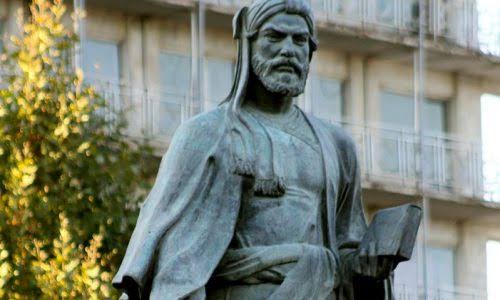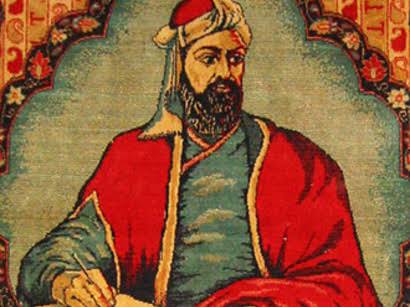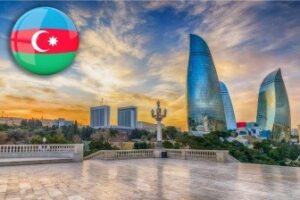Nizami Ganjavi, Poet and Polymath

Nizami Ganjavi a polymath born 1141 A.D. in Ganja today’s Azerbaijan and his real name was Jamal ad-Din Abu Muhammad Ilyas ibn-Yusuf ibn-Zakki one of the greatest poet in literary tradition.
From the father side he was a Turkish descendent and from maternal side he was Kurdish.
As a chronicle poet, he positions between Firdawsi born 940 A.D. a legendary poet and author of Shahnamah (Book of Kings) and Jalal Uddin Rumi (1207-1273), whose Divan e Kabir (Great Divan) and Kitab e Masnavi Ma’navi (Spiritual Couplets) define the forms of mystical narrative poetry.
Nizami poetry is broader than that of Firdawsi or Rumi in that it incorporates both the romantic and heroic dimensions of human relationships and explores the human psyche with unprecedented depth and understanding
Certainly Nizami poetry penetrates a deep spiritual consciousness and it would do him no favor to suggest otherwise, but he does not, like Rumi, direct the entire focus of his work on the evocation and articulation of the transcendent dimension of existence.
Nizami was not only a great creative artist and poet, but also a great intellectual; therefore he has often been classified as a poetic philosopher. We find in Nizami “a strong intellectual awareness, a tendency to question things and make fresh and often insightful comments on them or to rediscover old truths for himself”. His romantic epic poems are complete of passionate emotion and philosophical observation on humanity.

Nizami is best acknowledged for his Khamsa, or “Quintet” (five poems) – Treasury of Mysteries”, Khosrow o Shirin, Leyli o Majnun, Seven Beauties and Eskandar-Nameh consisting of 2 elements – “Iqbalnameh” and “Sharafnameh”. Every of the 5 epics composing his Khamsa area unit written with a singular meter. They arranged a robust foundation for the nice Nizami School of literature that continues to exert its influence these days.
Makhzan al-Asrar is a precious treasure of gem stones which a saint could recognize
It is the fountain of lifestyles which by no means dries up, which by no means grows vintage even in vintage age. If it’s far important for philosophers, it’s far similarly important for the mystics.
When poetry conveys a few message of high-quality importance and whilst tune warms up the coronary heart of the listeners and enraptures them, it’s far all because of motive. It is motive once more which illumines the coronary heart with a religious mild and leads the man or woman to the imaginative and prescient of the last truth.
His works Khosrow o Shirin, Leyli o Majnun, Haft Peykar (Seven Beauties) and Eskandar-Nameh is the great addition to the world literature.
- With complete inventive and structural explanation, the epic of Khosrow o Shirin turned to be an outstanding not just for Nizami except for all of world literature.
- Nizami composed the poem Leyli or Majnun at the request of Shirvanshah Akhsatan. Initially, he doubted that this simple story about the agony and pain of an Arab boy wandering between rugged mountains and scorching deserts was a suitable subject for the poetry of the royal court and its cultured audience. Nizami has used many Arabic anecdotes throughout poem, but also adds a strong Turkish flavor to the legend. He adapted Majnun’s disconnected stories to meet the needs of a Turkish love story.
- Haft Peykar is outstanding and lovely epic in poetry. One of the maximum vital poetical creations of the complete of oriental Indo-European literature. The Haft Peykar is taken into consideration the poet’s masterpiece. Overall, on this masterpiece, Nizami illustrates the concord of the universe.
- Eskandar-Nameh contains two parts, firstly the Sharafnameh concludes with Alexander’s unsuccessful search for the water of immortal life. The Iqbalnameh is a description of Alexander’s personal growth into the ideal ruler based on a pattern ultimately derived, through Islamic intermediaries, from Plato’s Republic.
I could most effective point out a number of those questions requested via way of means of Nizami Ganjavi.
- What is the game of life?
- What is that this world?
- How is one and lots of related? What is the character of loose will and determinism? What is ideal and evil?
- Is it feasible for the finite character to attain the Infinite?
- If not, how a long way is our attempt to attain that aim justified?
It is that this intellectual technique of Nizami that distinguishes him from his contemporary poets.
Lastly, being a poet I especially wrote a poem to tribute Nizami Ganjavi which summarize his attributes of personality:
His life that reflects an art form
He spent his life on sufi norm
Closed the river of knowledge in a jar
As legend he shines like a star
His poetry is like a magic
Panjganj is lovely like an imagic
He expressed deep romantic thoughts
His words are like flowerpots
His thinking was proficient with attention
His work reflects wonderful dimension
He knew truth and falsehood easily
He said romantic poems breezily
Humility and strength reflected in his words
His romantic poems are like singing birds
His life that reflects an art form
He spent his life on sufi norm
Nizami opened windows for wisdom
His poetic themes are stardom


